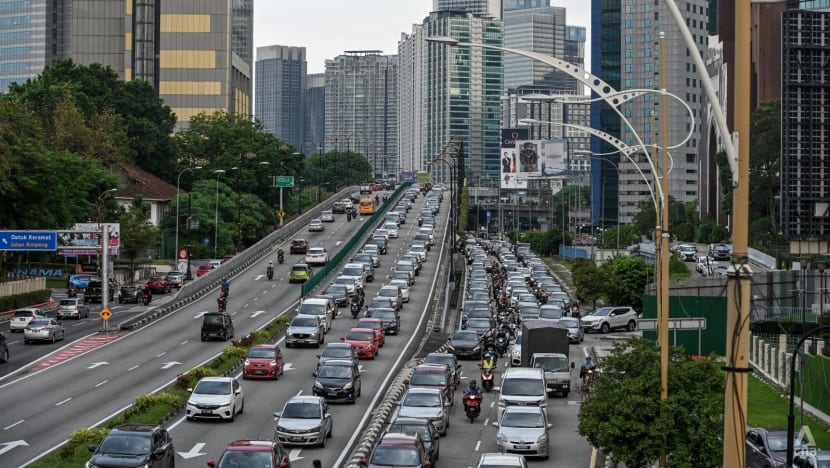Malaysia mulling traffic congestion charges, identifies Johor Bahru, KL, George Town for initial rollout
KUALA LUMPUR: Motorists in three major Malaysian cities – including Johor Bahru – may have to pay congestion charges should a proposal for such a mechanism that is currently being studied by the federal government get the green light.
But an official from the Johor state government has poured cold water on the plan, noting that the proposal may only work well if there is an efficient public transport system that is put in place beforehand, among other suggestions.
On Thursday (Feb 27), Minister in the Prime Minister’s Department Zaliha Mustafa said that Johor Bahru, Kuala Lumpur and Penang’s George Town are the three cities identified by the federal government for an initial rollout of the proposed congestion charges.
The Star reported the minister as saying in parliament that the proposed charges are still being studied by the Malaysian Institute of Road Safety Research and the Malaysian Green Technology and Climate Change Corporation.
Preliminary findings suggest that the congestion charge may reduce traffic in Kuala Lumpur by up to 20 per cent, Malay Mail reported the minister as saying.
In response to Zaliha’s announcement, Johor’s Works, Transportation and Infrastructure committee chairman Mohamad Fazli Mohamad Salleh said that his state is not yet ready for the idea to be put into practice.
“For now, Johor Bahru is not ready for this as we have yet to have a comprehensive public transport masterplan,” he was quoted as saying by The Star.
The Johor state government exco member also said that road users should be offered “park-and-ride options” outside the central business district before such a policy could be implemented.
Park-and-ride usually refers to a system for drivers to leave their vehicles in car parks and travel to the city centre via public transport.
Zaliha on Thursday said that the ongoing study - which is scheduled to be completed by this year - will examine its implementation mechanism, potential to reduce traffic volume and projected increases in public transport usage if the congestion charges were to be introduced.
“The charge cannot be too low but should discourage motorists from using certain roads. We also do not want the charge to be too high, which can burden consumers,” she said.
Zaliha added that the government is considering mechanisms implemented in other countries - including New York’s electronic license plate reader system, Singapore’s electronic road pricing mechanism and London’s congestion charge zones.
The minister was responding to a question by Member of Parliament for Padang Serai Azman Nasrudin who wanted to know about the congestion charge mechanism and the expected reduction in traffic volume.
Citing data, Zaliha said that approximately 1.5 million vehicles enter and exit Kuala Lumpur over 24 hours while public transport ridership was only at 25 per cent capacity.

“I agree with the transport minister’s stance that it is not appropriate to impose a congestion charge without a complete and integrated public transport system,” Zaliha said, referring to Malaysia’s Transport Minister Anthony Loke.
Last week, Loke said that congestion charges in Malaysian cities are not feasible, emphasising that providing a reliable public transportation system has to be prioritised.
“Introducing congestion charges without providing a reliable public transportation alternative will only place additional pressure on the public and negatively impact their socio-economic well-being,” he was quoted as saying by the New Straits Times (NST).
Prior to this, then-transport minister Wee Ka Siong in 2022 said that congestion charges or environmental fees for vehicles entering Kuala Lumpur will only be considered after a comprehensive public transportation network is readily available.
Earlier on Tuesday, Zaliha told parliament that congestion charges are among the measures proposed in the Kuala Lumpur Traffic Master Plan 2040 to mitigate traffic congestion in the capital city, noting that a comprehensive ecosystem must be developed to encourage the public to use public transportation.
“A study conducted by Prasarana Malaysia Bhd in 2020 revealed that traffic congestion resulted in losses amounting to RM20 billion (US$4.5 billion) at that time,” she was quoted as saying by NST.Disclaimer: Investing carries risk. This is not financial advice. The above content should not be regarded as an offer, recommendation, or solicitation on acquiring or disposing of any financial products, any associated discussions, comments, or posts by author or other users should not be considered as such either. It is solely for general information purpose only, which does not consider your own investment objectives, financial situations or needs. TTM assumes no responsibility or warranty for the accuracy and completeness of the information, investors should do their own research and may seek professional advice before investing.
Most Discussed

No relevant data is available